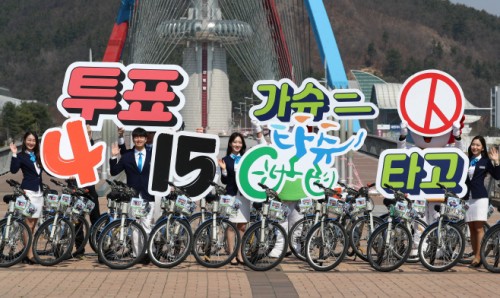 |
| Daejeon Election Commission’s PR ambassadors are conducting a campaign to encourage voters to cast their ballots in the upcoming April 15 general election, at Daejeon Expo Citizens Square on March 23, 2020./ Source: Yonhap News |
By AsiaToday reporters Lim Yoo-jin & Woo Sung-min & Kim Yeon-ji
There is concern that the voter turnout for the upcoming general election will be significantly low due to the COVID-19 outbreak. There is also a strong voice urging the country’s election commission as well as the administration, the National Assembly and political parties to come up with drastic measures to avoid low turnout. Experts suggest that prospective voting methods, such as extending early voting period and allowing voters to cast their ballots at home, should be actively reviewed.
“One way to disperse crowds of voters is to extend the voting period,” said Shin Yul, a political science and diplomacy professor at Myongji University. “There are many things that the National Election Commission should consider apart from extending the voting period, such as holding ‘drive-thru’ elections.”
To ensure voters’ health and safety, thorough sanitary measures will be taken. The election commission strongly urged voters to wear face masks when visiting polling station for early voting slated for April 10-11. At the entrance, voters will have their temperature checked. Then they have to disinfect their hands with sanitizer to cast ballots. However, experts point out the measure is insufficient to dispel the public anxiety. “Election officials should keep the distance between waiting voters at 2 meters both at the entrance of polling stations and inside to avoid mass, and frequently disinfect polling booths and ballot stamps,” said political commentator Choi Young-il.
Some experts suggest that TV debates and election advertisements that are originally allowed to parties fielding proportional representation candidates should be exceptionally permitted to other parties in order to prevent ‘blind election’. If that’s practically impossible by election law, policy debates organized by the press should be boosted to allow voters to compare political parties’ election pledges and candidates.
“Rather than the election commission, public TV services and other organizations should hold policy debates to increase voter participation,” said Lee Hyun-chool, a political science and diplomacy professor at Konkuk University. “The election will be blinded since the ruling and main opposition parties that do not field proportional representation candidates are not able to hold debates on TV,” said prof. Kim Tae-il from Yeungnam University. “Voter turnout is expected to fall for the upcoming election. If this is the case, the election would not fully reflect the public opinion. To prevent this from happening, the government should explore ways to encourage voters to cast their ballots without risking COVID-19 infection,” Kim said.
“Taking this opportunity, it is necessary to make the voting system more convenient in light of the changing times, such as introducing mobile voting,” said Choi. “It’s an opportunity to introduce a mobile voting system experimentally. But it’s a pity that consensus cannot be reached due to the distruct of Korean politics,” he added.
#turnout #general election #April 15
Copyright by Asiatoday
Most Read
-
1
-
2
-
3
-
4
-
5
-
6
-
7





















